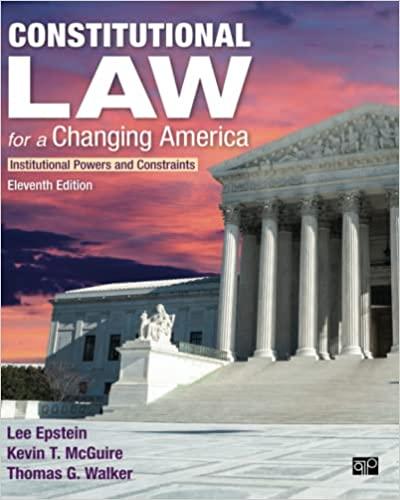Question
1. The decision in U.S. v. Leon (1984): a.) provided the good faith exception to the exclusionary rule in all courts. b.) excluded evidence resulting
1. The decision in U.S. v. Leon (1984):
a.) provided the "good faith" exception to the exclusionary rule in all courts.
b.) excluded evidence resulting from legal arrest from being admitted at trial.
c.) excludes all evidence tainted by illegal police procedure from being admitted during trial.
d.) provided the "good faith" exception to the exclusionary rule in all federal courts.
2. What four questions distinguish curtilage from open fields?
3. The Fourth Amendment prohibition against unreasonable searches and seizures is not violated unless the government action infringes upon someone's reasonable expectation of privacy.
a.) TRUE
b.) FALSE
4. The Open Fields Doctrine allows law enforcement to search any land that is not enclosed within four walls.
a.) TRUE
b.) FALSE
5. A Franks hearing is a hearing to determine whether statements made by the police in an affidavit to obtain a search warrant are false and constitute perjury or reckless disregard for the truth.
a.) TRUE
b.) FALSE
6. _______________ is excessively specific or overly technical.
7. What year was the Fourth Amendment added to the Constitution?
8. Documents granted by the King of England that allowed British soldiers to freely enter into homes and businesses in Colonial American to search for contraband is ______ __ _________.
a.) Writ of Assistance
b.) Writ of Execution
c.) Writ of madamus
d.) Writ of Certiorari
9. Explain (in full detail) what is reasonable expectation of privacy.
10. List the four inquiries when analyzing a search & seizure question
Step by Step Solution
There are 3 Steps involved in it
Step: 1

Get Instant Access to Expert-Tailored Solutions
See step-by-step solutions with expert insights and AI powered tools for academic success
Step: 2

Step: 3

Ace Your Homework with AI
Get the answers you need in no time with our AI-driven, step-by-step assistance
Get Started


